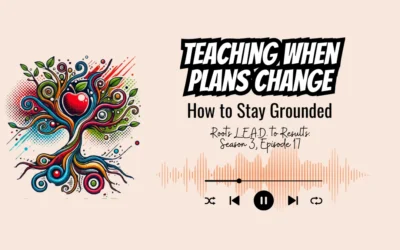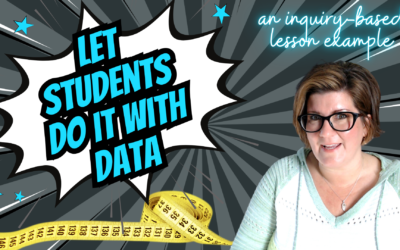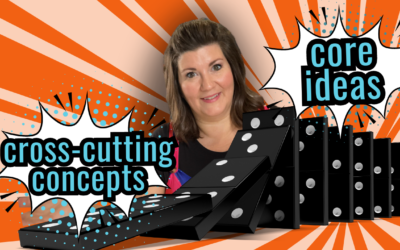




Active Learning In Secondary Science
Inquiry-Based Science Activities
Inquiry-Based Chemistry Examples
Student-Centered Science Classrooms
Teaching With Technology
Teaching When Plans Change: How to Stay Grounded
There are days in teaching when nothing actually goes wrong — and yet everything feels unsettled. The lesson plan is solid. The materials are ready. The students are there. And still, something shifts. A schedule changes. A policy is announced. A...
Student-Centered Teaching Made Simple with Visible Learning Strategies
Student-centered teaching is more than a buzzword—it’s a mindset that transforms the way students engage with science. In this episode of The Student-Centered Science Teacher Podcast (now "Roots L.E.A.D. to Results"), I dive into Visible Learning...
A Better 5E Lesson Plan Template for High School: Make Inquiry-Based Science Lessons Work Every Day
The 5E instructional model has been widely used in science classrooms for years, providing a structured framework to help students engage with scientific concepts. While it has many benefits, traditional 5E lesson plan templates are often...
Ionization Energy Worksheet Meets Data-Driven Discovery: A New Way to Teach This Periodic Trend
We’ve all been there—you spend time preparing an ionization energy worksheet (or searching for a free one online), expecting it to solidify student understanding and provide a source of reference notes for them to study from in the future. And...
An Ions Activity That Makes Math Manageable: How to Use Mathematics and Computational Thinking in NGSS Chemistry
Teaching high school chemistry often feels like teaching math in disguise. If you've ever thought, "I didn’t realize I signed up to be a math teacher!"—you’re not alone. Using mathematics and computational thinking is even a core science practice...
Developing and Using Models Makes For Optimal Octet Rule Evidence!
You just finished teaching a lesson and you're feeling really great about it. You've led a discussion and engagement was okay. You're sure your students are "getting it" so you try to go deeper. You ask, "WHY?" .... and you're met with silence!...
These NGSS Cross-Cutting Concepts Will Make Your Octet Rule Worksheets Outstanding!
If you’re a high school chemistry teacher, chances are you’ve leaned on lecturing, notes, rote memorization, and drill practice using octet rule worksheets to teach the octet rule concept and reinforce its implications. While repetition is...
NGSS Chemistry in Action: Electron Configurations, Evidence, and Periodic Patterns
Surely, you’ve encountered that classic classroom question: “Why do we even have to learn this?” Whether it’s recently come from this year’s classroom or your own distant memories as a student, topics like electron configurations can easily fall...
Empower Students with an Engaging Electron Configuration Activity
As a visual learner, chemistry always came naturally to me because it's a subject where abstract concepts are brought to life through models. Chemical formulas, chemical reactions, orbital diagrams, and...
An Inquiry-Based Atomic Radius Exploration That Makes Chemistry Class Exciting
Teaching periodic trends like atomic radius, ionization energy, and electronegativity can feel like a repetitive cycle of definitions, drills, and practice. Many high school chemistry teachers stick to traditional methods, grouping trends together...
An Inquiry-Based Bohr Model Activity To Spark Colorful Curiosity
Teaching the Bohr model is often where the journey of understanding chemical change begins in high school chemistry. Using this Bohr model activity as part of a larger inquiry-based science lesson allows students to connect the microscopic world of...
How To Cultivate A Student-Centered Teaching Philosophy Using Servant Leadership Principles
When we think about teaching using student-centered approaches, the first thing that probably comes to mind is how we can better serve our students. We want to make sure they are engaged, encourage them to ask questions, and help them discover...
How To Use Cross-Cutting Concepts In Science For Perfect Lesson Plans
In today's ever-evolving educational landscape, science teachers are tasked with integrating complex concepts into their lesson plans while fostering active learning environments. The Cross-cutting concepts...
How To Lead Active Learning in Science This Year
Active learning in science is more than just a buzzword! It's a transformative approach that brings energy and engagement to the classroom. You love teaching on lab day because that's when science truly comes alive. Problem-solving, teamwork, and...
Inquiry-Based Science Activities | How To Design Them!
Inquiry-based science activities have transformed student engagement in my chemistry classroom. By incorporating them into my lesson plans every day, I have empowered my students to become active participants in their learning journey, because...















